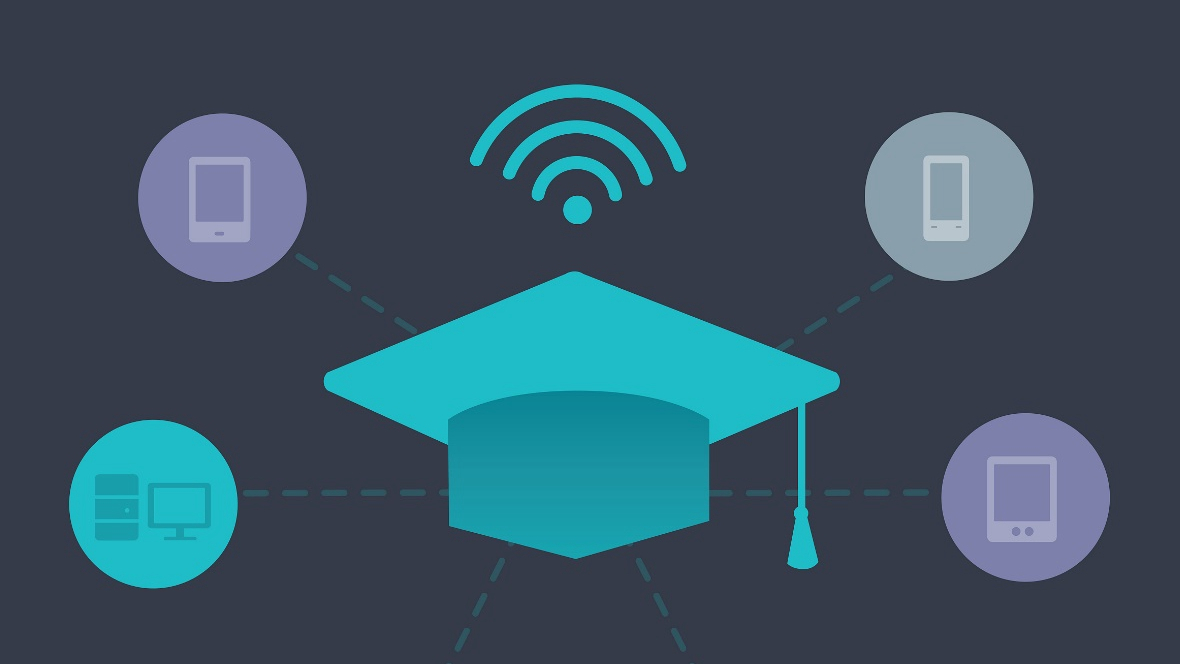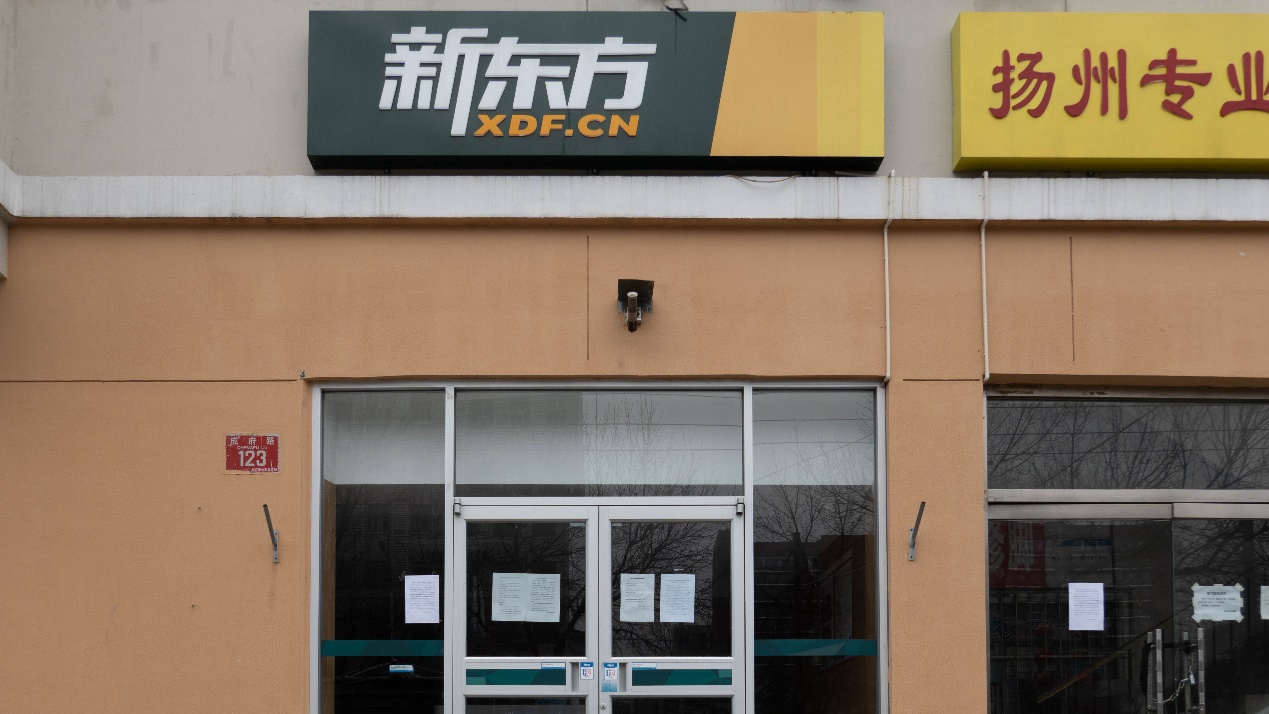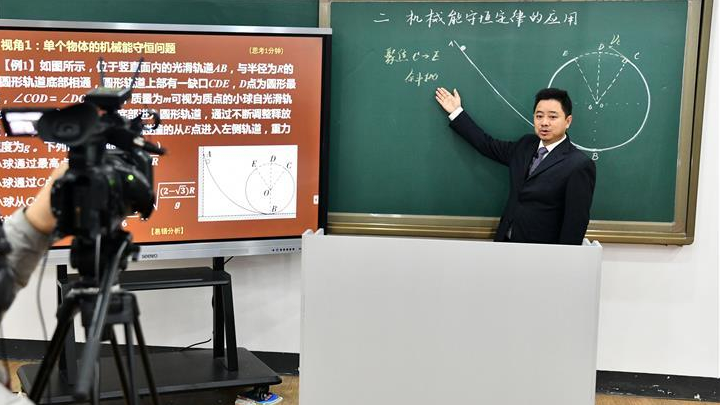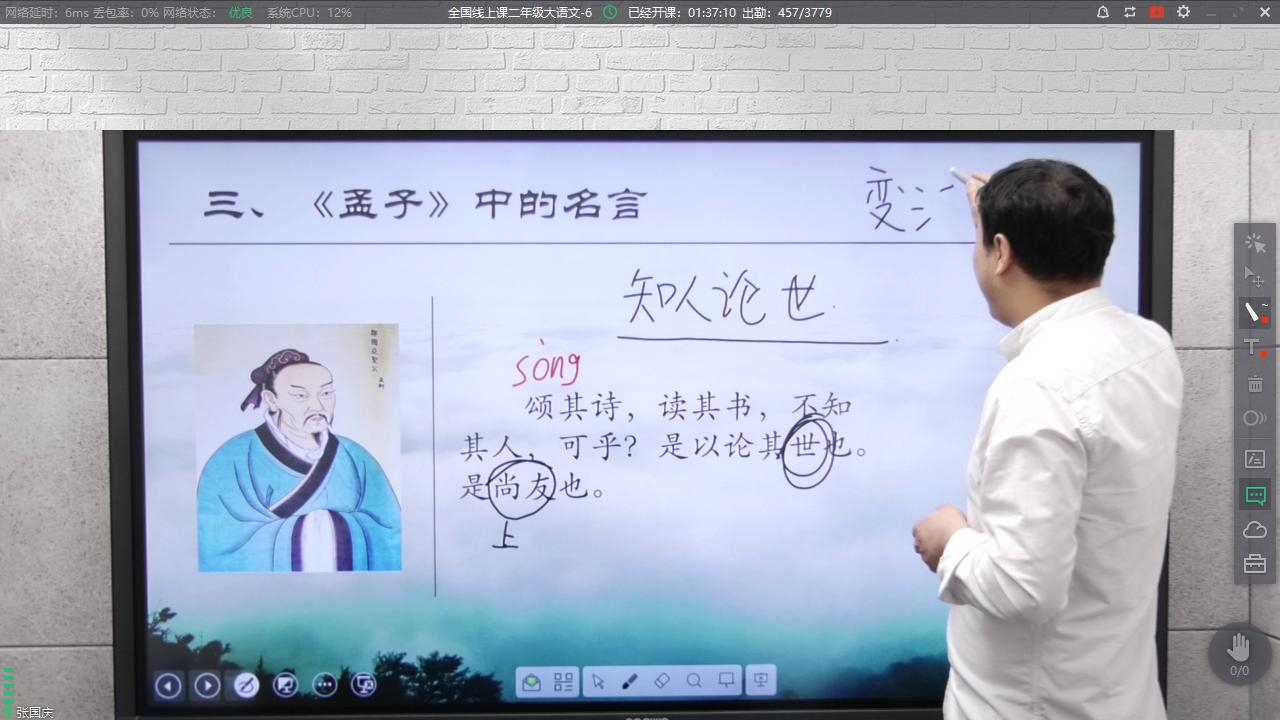After February 8, the Lantern Festival, it is supposed to be the beginning of a new semester for schools across China, but this year students are still on an extended winter vacation due to the coronavirus outbreak.
To prevent the spread of the novel coronavirus, China's Ministry of Education (MOE) in late January announced to postpone the 2020 spring semester for schools and further required on Tuesday that extracurricular training organizations are not allowed to start classes early without authorization.

Closed school gate of China University of Geosciences, Beijing, China, February 14, 2020. /CGTN Photo by Qu Bo
Closed school gate of China University of Geosciences, Beijing, China, February 14, 2020. /CGTN Photo by Qu Bo
Taking advantage of the moment, online educational companies have started taking their operations online.
EF Education First, an English language training provider has canceled or postponed all offline lessons and then, took them online.
Many private educational and training institutions besides the Lucerne-based education giant, such as New Oriental, TAL Education, and Offcn Education have successively shifted their focus to online lessons.
To attract students and their parents, they provided free online lessons. Even the elevators of many residential buildings are bombarded by dazzling ads about online education.

Ma, a mother with two children in kindergarten said the online programs are convenient. She doesn't have to pick up her kids from school and her kids can learn from an iPad.
"Online teaching can also compensate for the shortage of education resources, especially for students in relatively underdeveloped cities. Parents are also satisfied as they usually spend less on online lessons for their kids compared to other real classrooms," said Emma, an online English teacher from zuoyebang, an online education startup in China.
How does it work?
However, the choice to transfer real classrooms into online lessons is not an easy task.
Server crashes, unstable networks, endless registration on various apps and lots of WeChat groups… the online classroom has led a heated debate on Weibo, a Twitter-like social media platform.
Yu Minhong, founder of New Oriental, talked about three difficulties companies face in an article posted on his official WeChat account. First, the online system is not ready for the sudden transformation. Second, some teachers don't have experience teaching online. And third, students and parents may not accept this form of teaching.
On the first day of the free live course on zuoyebang, which has over 400 million users now, there were 5 million users online at the same time, causing the server to overload.
Other traditional education institutions, which have to use a third-party platform, face problems like bandwidth limitations, online surveillance and simply the proper equipment.
Youwin Education, a private tutoring institution, transferred all the classroom teaching into online teaching during the epidemic, such as one-on-one online tutoring and class tutoring.
"We use ClassIn, DingTalk and Wechat to do online teaching during the period, but it's not easy because we need to cope with internet issues, adjust staff responsibility and even the cancellation of some positions during this time," said Sun Jian, marketing executive of a Beijing Campus of Youwin Education.
Teachers indeed are faced with new challenges as not all of them are experienced in online teaching and they often also deal with technical problems that can interrupt the lessons.
"New Oriental launched some online lessons for free, and the lessons that should be taught in the classroom were turned into online lessons with certain discounts given," said Vivian, an English teacher from New Oriental.

An outlet of New Oriental in Beijing closes its door. /CGTN Photo by Qu Bo
An outlet of New Oriental in Beijing closes its door. /CGTN Photo by Qu Bo
"But some parents are worried about the results of online teaching as teachers cannot instruct their children personally, and some children cannot keep their attention and be self-disciplined," Vivian added.
Besides learning outcome, more parents concern more about children's health. Ma explained that if online education becomes mainstream later, it means that children are looking at a computer or other electronic products all day, which can be unhealthy as well.
Neal, a student from Henan Province who's taking the national college entrance examination this year, is more inclined to offline classes. "Online lessons are more flexible so that we don't need to sit in the classroom, but that's why each of our feedback cannot be given to the teacher timely."
Competition everywhere
Traditional tutoring agencies are also involved in the fiercer contest with other online competitors.
"Traditional tutoring institution has fewer students at this time. Online lessons are cheaper compared with classroom lessons, so the teacher's payment is relatively reduced during the period," said Sun.
Another headache is the contradiction with online learning required by public schools as the MOE has postponed the start of school and online learning is encouraged during the period.
The MOE has issued a guideline for universities to organize online classes, with 22 online platforms offering 24,000 courses to students and will launch more in the future.

A teacher in Guizhou Province is teaching physics online, February 13, 2020. /Xinhua Photo
A teacher in Guizhou Province is teaching physics online, February 13, 2020. /Xinhua Photo
It will also start uploading K-12 courses to a national public service education platform next Monday to provide students in elementary and secondary schools with education resources covering all major school subjects.
"In the future, public schools will also pay more attention to online lessons, which would be bad for the online teaching of private institutions. But in the long run, classroom teaching cannot be replaced," Sun added.
Bai Jiaoyu, president of Kids & Teens at EF Education First China firmly agreed that online teaching cannot totally replace traditional offline education, and can only play a role as a supplement to the offline classroom teaching.
"The long-term teaching experience shows that the unique feature of the offline teaching methods, such as the face-to-face communication with teachers, the acquisition of social skills, and the peer-to-peer practice and engagement are crucial to the language acquisition and retention of the young learners," she stressed.
"But we firmly believe that the online and offline blended teaching will the winning methodology in the future. The successful integration of the advanced technology, the well-organized curriculum and the professional teacher will greatly enhance the learning efficiency," Bai cited.
Challenge and opportunity
The epidemic is both a challenge and an opportunity for private educational institutions, said Zhang Guoqing, co-founder and senior executive of Zhuge Academy.
As a player mostly in real classrooms, Zhuge Academy, an education brand specialized in Chinese teaching owned by Lanxum Inc, rolled out online lessons taught by elite teachers.
"Students in the same grade can all together take popular lessons by elite teachers online during the period without any additional charges. In the past, it's hard to apply for these lessons because of the limited number of enrolled in each class," said Zhang.

A classical Chinese class online, February 9, 2020. /Zhuge Academy Photo
A classical Chinese class online, February 9, 2020. /Zhuge Academy Photo
Online education is a new trend as modern technology like AI has been employed in the educational industry. Back in 2003 when SARS broke out, the e-commerce business and delivery services took the opportunity to develop quickly, so this special time also provides new opportunities for online education, Zhang observed.
"After weathering through the epidemic, education will go back to classrooms. The short-term flux of students taking online lessons is expected to recede in the second half of the year," Zhang added.
According to China Education Development Report 2018 released by Deloitte China in August 2018, the overall market size of K12 will exceed 500 billion yuan (about 71.64 billion U.S. dollars) in 2020, with a compound growth rate of 9.2 percent in the next three years.
"Under the pressure of the fast growth as demanded by the investors, many online education institutions put too much focus on sales and marketing rather than the customer experience and teaching quality," said Bai. "This certainly confuses customers in the short run and puts the whole online education industry at risk."
"Only those companies who invest more on product research, training of teachers, improvement of services and fast adoption of new technologies can be the winner in the end," she said.